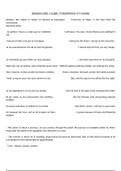DEMAIN DÈS L’AUBE (TOMORROW AT DAWN)
Demain, dès l’aube, à l’heure où blanchit la campagne Tomorrow, at dawn, in the hour when the
countryside k
becomes white,
Je partirai. Vois-tu, je sais que tu m’attends. I will leave. You see, I know that you are waiting for
me.
J’irai par la forêt, j’irai par la montagne. I will go by the forest, I will go by the mountain.
Je ne puis demeurer loin de toi plus longtemps. I cannot stay far from you any longer.
Je marcherai les yeux fixés sur mes pensées, I will walk eyes fixed on my thoughts,
Sans rien voir au dehors, sans entendre aucun bruit, Without seeing anything outside, nor hearing any noise,
Seul, inconnu, le dos courbé, les mains croisées, Alone, unknown, the back curved, the hands crossed
Triste, et le jour pour moi sera comme la nuit. Sad, and the day for me will be like the night.
Je ne regarderai ni l’or du soir qui tombe, I will not look at the gold of the evening which falls,
Ni les voiles au loin descendant vers Harfleur, Nor the faraway sails descending towards
Harfleur.
Et quand j’arriverai, je mettrai sur ta tombe And when I arrive, I will put on your tomb
Un bouquet de houx vert et de bruyère en fleur. A green bouquet of holly and flowering
heather.
- The poem is about a journey ( as you journey through the poem, the journey is revealed) written by Victor
Hugo after the death of his daughter (she drowned in a river)
- The manner in which he is travelling (intent,alone,focused,not distracted) tells us that what he intends to do
is important to him (almost like an appointment)
- Tone : sérieux, trieste, sombre




